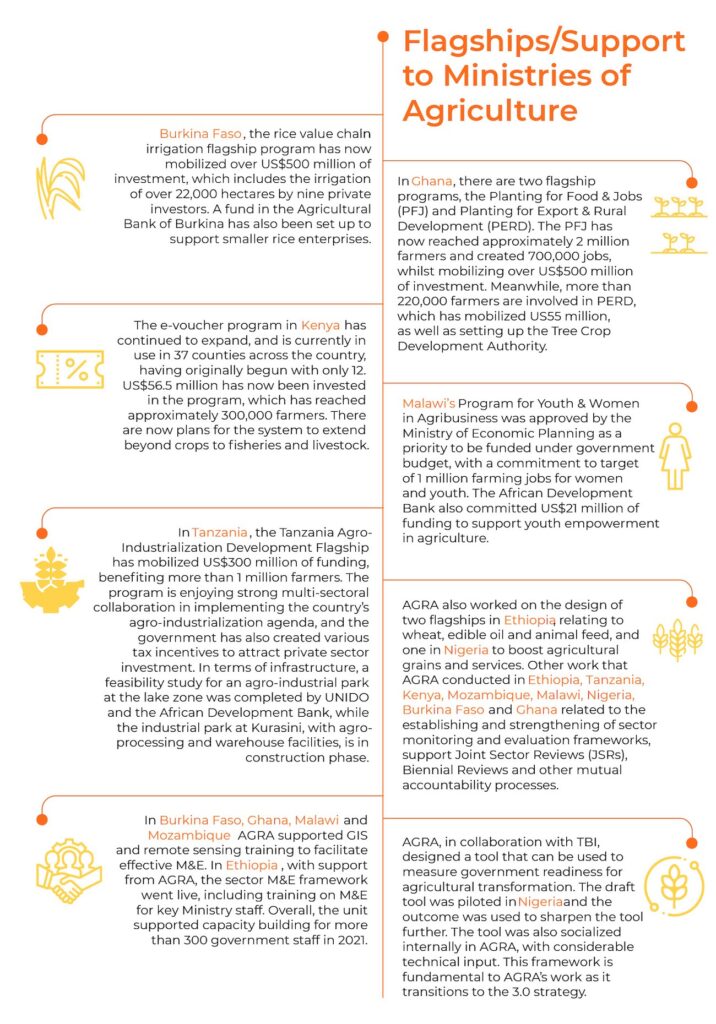State capability & policy development support
We support governments in playing their crucial leading role in transforming agriculture - in coordination, investment, trade, policy, and enabling the private sector
In 2021, AGRA continued to make good progress with its efforts to improve state capability in its 11 focus countries. We have successfully demonstrated the validity of this model as it has matured, not least through the acceleration of its flagship programs, most notably the e-voucher system in Kenya. AGRA’s work with governments to deliver agricultural transformation is essential because it is a major driver of sectoral policies and investments. Good policy making also encourages private sector investment; and finally, responsibility for proper sector coordination as between Ministries and Agencies, development partners and other sector stakeholders fundamentally rests with government, meaning that state capability is essential to achieve effective and efficient program delivery.
AGRA supported the development of new Institutional Capacity Strengthening Plans (ISCPs) in Kenya, Ghana, Nigeria, and Tanzania, and also assisted with the implementation of existing plans in Ethiopia and Burkina Faso. We helped Kenya to identify key ISCP areas for implementation in 2022 through a rapid results initiative approach. In implementing this activity, we worked with various partners including FAO, MAFAP, USAID, GIZ, BMGF, CIDA, IFPRI, World Bank, SIDA and local think tanks and universities.
Advocacy
AGRA has continued to strengthen collaboration and partnership with the Africa Union Commission (AUC) and Regional Economic Communities (RECs) in supporting Member States in the implementation of the CAADP Malabo Commitment through the revision and restructuring of the AU entities support. Working closely with the AUC, Africa Union Development Agency (AUDA) and the RECs, the AGRA grant to the AUC is supporting the 2021 Biennial Review (BR) process across the 55 member states and 6 RECs through trainings of national BR experts, support for data collection, review, and national and regional validations.
HAPA
The Hub for Agricultural Policy Action (HAPA) was designed as a distinct service offering by AGRA to provide evidence consolidation and translation advisory services to governments seeking to reform, refine or develop a clear policy direction. In the first half of 2021, a significant proportion of HAPA’s work focused on its inception, developing country engagement strategies and building pipelines. At the time of reporting, HAPA was close to finalizing contracting in almost nine of the AGRA target countries.
As part of the HAPA country engagement process with key leadership in partner countries, the AGRA president sent letters to Ministers of Agriculture in all 14 AGRA focus countries introducing the HAPA initiative as a resource that is available to support their policy efforts. Following these letters, AGRA signed memoranda of understanding with the governments of Zambia and Mozambique to facilitate HAPA support. Between February and May 2021, the HAPA team held conversations with ministers of agriculture in Ethiopia, Tanzania, Nigeria, Mozambique, Malawi and Zambia to discuss their countries’ priority policy areas that HAPA could support. As a result, HAPA has received formal requests for policy support from the governments of Tanzania, Malawi, Zambia, Mozambique, Nigeria and Kenya.
CALA
2021 saw the launch of the African Leadership Initiative, now called the Centre for African Leaders in Agriculture (CALA). The program has now been rolled out and the first cohort was identified and trained. Mentoring and coaching of participants is also going on across the priority countries. CALA is being implemented in collaboration with Africa Management Institute and USAID Policy LINK.

Africa Food Prize
The 2021 Africa Food Prize was won by the International Crops Research Institute for the Semi-Arid Tropics (ICRISAT). Between 2007 and 2019, ICRISAT led a collaboration of partners to develop 266 improved legume varieties and almost half a million tons of seed for a range of crops, including cowpeas, pigeon peas, chickpea, common bean, groundnut and soybean. These new varieties have helped over 25 million smallholder farmers become more resilient to climate change, as well as pest and disease outbreaks. AGRA commends and admires ICRISAT for this work, and extends its heartfelt congratulations on winning such a prestigious award.
